
Hematology experts highlight the MDS, lymphoma, and myeloma data they were most excited to see at the 2025 SOHO Annual Meeting.

Your AI-Trained Oncology Knowledge Connection!


Hematology experts highlight the MDS, lymphoma, and myeloma data they were most excited to see at the 2025 SOHO Annual Meeting.

A chemotherapy-free regimen of mosunetuzumab and polatuzumab vedotin improved PFS and response rates vs R-GemOx in relapsed/refractory LBCL.

Treatment with mosunetuzumab plus polatuzumab vedotin yielded high response rates and had a manageable safety profile in BTK inhibitor–exposed MCL.
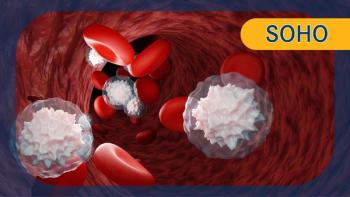
Loncastuximab tesirine plus glofitamab demonstrated early promise in patients with relapsed or refractory large B-cell lymphoma.
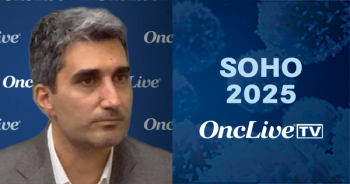
Ghayas C. Issa, MD, MS, discusses the optimal timing of and approaches to genetic testing for NPM1 and KMT2A alterations in AML.

Frontline treatment with mosunetuzumab showed high antitumor activity in patients with marginal zone lymphoma regardless of risk status.

Treatment with an investigational allogeneic T-cell immunotherapy improved outcomes vs conventional transplant in patients with hematologic malignancies
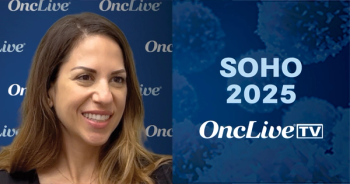
Sanam Loghavi, MD, discusses standard-of-care frontline testing in myelodysplastic syndrome.

Subcutaneous daratumumab monotherapy demonstrated a 24-month PFS rate of 79.9% in patients with high-risk smoldering multiple myeloma.
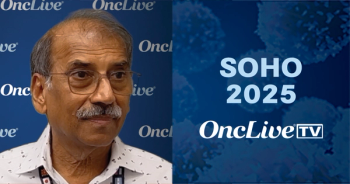
Sundar Jagannath, MBBS, explores how minimal residual disease could redefine what it means to achieve a "cure" in multiple myeloma.
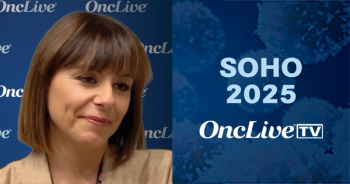
Francesca Palandri, MD, discusses research needed to clarify the role of predictive markers for ruxolitinib response in myelofibrosis.
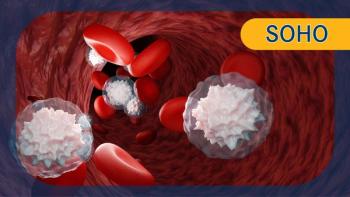
The combination of ziftomenib and cytarabine/daunorubicin showed a manageable safety profile with early efficacy in NPM1-mutated and KMT2A-rearranged AML.

Favorable long-term outcomes were reported with brexu-cel in patients with B-ALL and low disease burden who achieved peak CAR T-cell expansion.

Zanubrutinib bested acalabrutinib plus venetoclax in terms of PFS in patients with treatment-naive, low-risk CLL.

Findings from a meta-analysis associated asciminib with improved efficacy and safety vs other TKIs in chronic myeloid leukemia.

First-line venetoclax plus azacitidine did not improve overall survival vs placebo plus azacitidine in treatment-naive, higher-risk MDS.

Continuous zanubrutinib improved PFS and showed a trend for improved OS vs fixed-duration venetoclax-based therapy in treatment-naive CLL/SLL.

A post hoc analysis demonstrated the efficacy of olutasidenib monotherapy in primary refractory patients with IDH1-mutant AML.

Zanubrutinib was associated with lower treatment switching rates vs acalabrutinib and ibrutinib in real-world chronic lymphocytic leukemia.

Brentuximab vedotin plus lenalidomide/rituximab significantly improved outcomes vs lenalidomide/rituximab alone in relapsed/refractory DLBCL.

Golcadomide given at 0.4 mg plus R-CHOP elicited a high rate of metabolic responses in patients with previously untreated aggressive B-cell lymphoma.

Neha Mehta-Shah, MD, MSCI, discusses unmet needs and future developments in the treatment of patients with peripheral T-cell lymphoma.

The uptake of subcutaneous rituximab has lagged behind the use of the intravenous version in non-Hodgkin lymphoma.
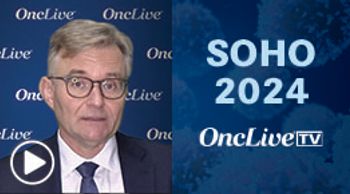
Grzegorz S. Nowakowski, MD, discusses the treatment landscape for DLBCL and the need for novel therapeutic approaches in the second-line setting.
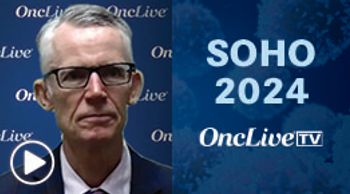
John Seymour, MBBS, FRACP, PhD, discusses the role of genetic profiling in the treatment of chronic lymphocytic leukemia.

Liso-cel produced responses across subgroups of relapsed/refractory chronic lymphocytic leukemia or small lymphocytic lymphoma.

Treatment with valemetostat demonstrated activity and was tolerable in patients with relapsed/refractory peripheral T-cell lymphoma.

D-VRd improved rates of MRD negativity and sustained MRD negativity vs VRd in transplant-eligible, newly diagnosed multiple myeloma.

Elias Jabbour, MD, discusses the potential activity and financial benefit of novel and emerging TKIs for first-line management of chronic phase CML.

Reid Merryman, MD, discusses the evolution of minimal residual disease assays in lymphoma.